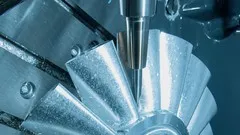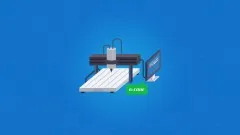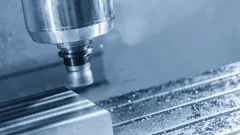
Rigid Tapping with New Motor and VFD (DIY CNC Mill Upgrades 3) 
This course covers the upgrades to a DIY CNC Mill, focusing on Rigid Tapping with a new motor and VFD. It introduces tapping and threads, tension compression tapping, thread milling, and the use of a general duty motor and Marathon Inverter Motor. It also covers motor mounting plates, taper lock pulleys, and the decision to DIY or buy a CNC Mill, as well as belting. This course provides all the necessary information to upgrade a DIY CNC Mill. ▼
ADVERTISEMENT
Course Feature
![]() Cost:
Cost:
Free
![]() Provider:
Provider:
Youtube
![]() Certificate:
Certificate:
Paid Certification
![]() Language:
Language:
English
![]() Start Date:
Start Date:
On-Demand
Course Overview
❗The content presented here is sourced directly from Youtube platform. For comprehensive course details, including enrollment information, simply click on the 'Go to class' link on our website.
Updated in [February 21st, 2023]
This course, Rigid Tapping with New Motor and VFD (DIY CNC Mill Upgrades 3), provides an introduction to tapping and threads, tension compression tapping, thread milling, general duty motor, Marathon inverter motor, motor mounting plate, taper lock pulleys, DIY or buy CNC mill, belting, installing inverter motor, accuracy of stock VFD, AC motor control, selecting a VFD, installing new VFD, testing VFD, spindle encoder, rigid tapping testing wax, types of taps, and rigid tapping testing metal.
[Applications]
After completing this course, participants should be able to apply the knowledge gained to upgrade their CNC mill with a new motor and VFD. This includes understanding the different types of tapping and threads, tension compression tapping, thread milling, motor mounting plate, taper lock pulleys, belting, installing an inverter motor, accuracy of stock VFD, AC motor control, selecting a VFD, installing a new VFD, testing a VFD, spindle encoder, rigid tapping testing wax, types of taps, and rigid tapping testing metal. With this knowledge, participants should be able to upgrade their CNC mill with a new motor and VFD and improve the accuracy and performance of their machine.
[Career Paths]
1. CNC Machinist: CNC machinists are responsible for operating and programming computer numerical control (CNC) machines to produce precision parts and components. They must be knowledgeable in the use of CNC machines, as well as the materials and tools used in the machining process. The demand for CNC machinists is expected to grow as the use of CNC machines increases in manufacturing and other industries.
2. Automation Engineer: Automation engineers are responsible for designing, developing, and implementing automated systems to improve efficiency and reduce costs. They must be knowledgeable in the use of robotics, automation software, and other technologies used in automation. The demand for automation engineers is expected to grow as more companies look to automate their processes.
3. Robotics Technician: Robotics technicians are responsible for maintaining and repairing robotic systems. They must be knowledgeable in the use of robotics, automation software, and other technologies used in robotics. The demand for robotics technicians is expected to grow as more companies look to automate their processes.
4. Industrial Maintenance Technician: Industrial maintenance technicians are responsible for maintaining and repairing industrial machinery and equipment. They must be knowledgeable in the use of tools, machines, and other technologies used in industrial maintenance. The demand for industrial maintenance technicians is expected to grow as more companies look to automate their processes.
[Education Paths]
1. Mechanical Engineering: Mechanical engineering is a broad field that involves the design, development, and production of machines and tools. It is one of the oldest and most versatile engineering disciplines, and its graduates are in high demand in many industries. Mechanical engineering is a rapidly evolving field, with new technologies and materials being developed all the time. This degree path is ideal for those interested in designing and building machines, as well as those interested in the development of new technologies.
2. Robotics Engineering: Robotics engineering is a rapidly growing field that focuses on the design, development, and implementation of robots and robotic systems. Robotics engineers are responsible for creating robots that can perform a variety of tasks, from manufacturing to medical applications. This degree path is ideal for those interested in the development of new robotic technologies and the application of robotics in various industries.
3. Computer Science: Computer science is a broad field that involves the study of computers and their applications. It is a rapidly evolving field, with new technologies and applications being developed all the time. This degree path is ideal for those interested in the development of new computer technologies and the application of computers in various industries.
4. Electrical Engineering: Electrical engineering is a broad field that involves the study of electricity and its applications. It is a rapidly evolving field, with new technologies and applications being developed all the time. This degree path is ideal for those interested in the development of new electrical technologies and the application of electricity in various industries.
Course Provider

Provider Youtube's Stats at AZClass
Discussion and Reviews
0.0 (Based on 0 reviews)
Explore Similar Online Courses

Eocene D - Docking Wrangellia w& Basil Tikoff

Power BI Master Tutorial

Python for Informatics: Exploring Information

Social Network Analysis

Introduction to Systematic Review and Meta-Analysis

The Analytics Edge

DCO042 - Python For Informatics

Causal Diagrams: Draw Your Assumptions Before Your Conclusions

Whole genome sequencing of bacterial genomes - tools and applications

CNC Machine ISO and Macro Programming SwanSoft Fundamental

CNC Programming with G Code for Beginners


Start your review of Rigid Tapping with New Motor and VFD (DIY CNC Mill Upgrades 3)